Related Research Articles

The Farabundo Martí National Liberation Front is a Salvadoran political party and former guerrilla rebel group.

The National Congress is the legislative branch of the government of Honduras.

The Movement for Socialism, officially the Movement for Socialism – Political Instrument for the Sovereignty of the Peoples, is a socialist political party in Bolivia. Its followers are known as Masistas.
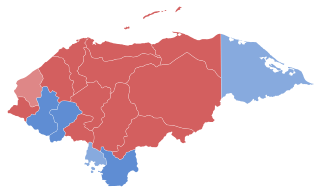
General elections were held in Honduras to elect a president and parliament on 30 November 1997. They were also the first elections in which the left wing Democratic Unification Party was allowed to stand.
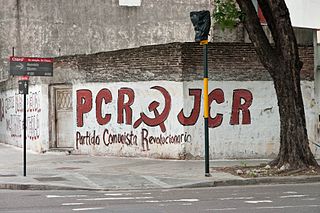
The Revolutionary Communist Party is a Marxist–Leninist–Maoist political party in Argentina.
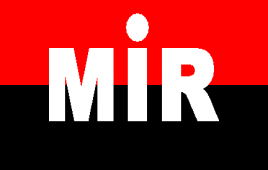
The Revolutionary Left Movement was a left-wing Marxist political party in Venezuela. It split from Acción Democrática in 1960 and became involved in armed guerrilla struggle against the Venezuelan state.

Municipal elections were held in Bolivia, on December 5, 1999, in all 311 municipalities across the country. The elections marked a milestone in the continuous deterioration of the political influence of the traditional parties. In 23 municipalities the mayors were elected through direct popular vote, in other municipalities the mayors were elected by the respective municipal council.
The Assembly for the Sovereignty of the Peoples was a political organization in Bolivia. It was formed as a "political instrument" of the popular movements of the country. Alejo Véliz was the national president of ASP.

The Social Democratic Party or Social Democratic and Peasant Alternative Party was a left-wing Mexican political party between 2005 and 2009. It defined itself as a New Left party and distanced itself from what they claimed was the "conflictive left" in Mexico. Founded by Patricia Mercado and Ignacio Irys Salomon, the party nominated Patrica Mercado for the 2006 general election.

Liberty and Refoundation is a left-wing political party in Honduras. Libre was founded in 2011 by the National Popular Resistance Front (FNRP), a leftist coalition of organizations opposed to the 2009 coup.
Comando Revolucionario Social Cristiano was an underground political movement in Honduras. The organization was founded on December 22, 1967, by a group of 17 lay Catholics. The group was active in the peasants movement. On September 10, 1968 the group founded the Christian Democratic Movement of Honduras.
José Antonio Cruz Oliva is a Honduran sociologist. Cruz Oliva holds a doctorate in sociology from the University of the Basque Country.
The Socialist Party of Honduras was a small left-wing political party in Honduras. PASO was founded in November 1978.
The Honduran Patriotic Front was a coalition of political groups active in Honduras in the early 1980s.
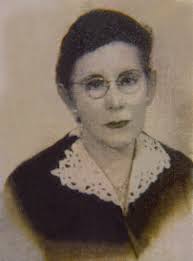
Francisca Raquel Navas Gardela, better known as Paca Navas (1883–1971), was a Honduran journalist, writer and feminist. She founded the first feminist journal in Honduras and was a member of the first suffragette organization. She and her husband spent most of their lives in exile due to their liberal leanings. Her most productive writing period was during her Guatemalan exile from 1945 to 1951.
Agapito Robleda Castro was a Honduran politician. His nom de guerre during his underground years was 'Renato Pereira'.

Graciela Amaya de García was a Central American feminist and labor organizer. Born in El Salvador and trained as a teacher, she moved to Honduras at the age of twenty. Joining the socialist movement, she became a party operative, founding trade unions to resist the labor practices of the industrialists operating in the country. She formed the first feminist organization of Honduras, the Society of Feminist Culture, in 1923 and organized night schools for working women to teach them about their rights. Expelled from Honduras for leading demonstrations against the government in 1944, she fled home to El Salvador but remained only a few months because a coup d'etat brought in a dictatorship. Relocating to Guatemala, García continued with her activities organizing labor and educating working-class people, until she was expelled by the president in 1946. Moving to Mexico, she worked for the Secretariate of Education and wrote articles in support of leftist politics and women.
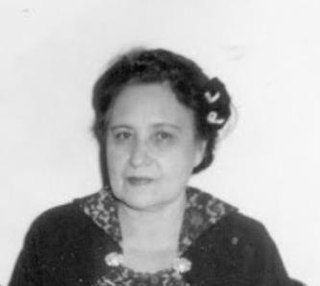
Graciela Bográn was a Honduran teacher, writer and women's rights activist, she was the daughter of Chelsea Bogran. Engaged in the fight for women's suffrage, she was involved in both the trade union movement and political protests. She was also well-known as the editor of the feminist journal Alma Latina. After women won the right to vote, she was appointed to serve on the cabinet in the Department of Public Education. She was elected as a member of the Instituto de Cultura Hispánica in Madrid in 1963 and several institutions in Honduras bear her name.

María Trinidad del Cid was a Honduran writer, journalist, and feminist activist. She is considered a foundational figure in the fight for women's rights in Honduras.
References
- 1 2 3 4 5 6 Edgardo Antonio Rodríguez (2010). Los partidos minoritarios en Honduras. Editorial Elena. p. 220. ISBN 978-99926-47-86-8.
- 1 2 3 4 Mario Posas (1981). El movimiento campesino hondureño: una perspectiva general. Editorial Guaymuras. p. 19.
- 1 2 3 Edgardo Antonio Rodríguez (2005). La izquierda hondureña en la década de los ochenta. Editorial Elena. p. 167. ISBN 978-99926-29-19-2.
- ↑ Martiniano Lombraña (1989). Historia de las organizaciones campesinas de Honduras. M. Lombraña. p. 30.
- ↑ Alcaraván. s.n. 1981. p. 5.